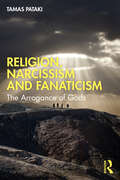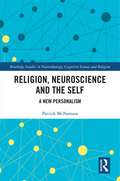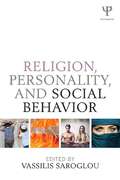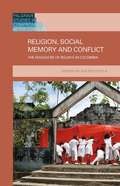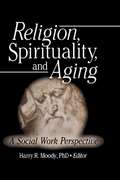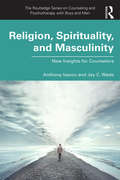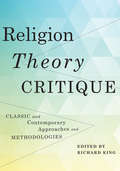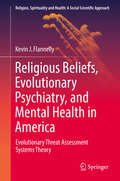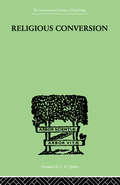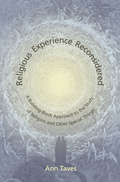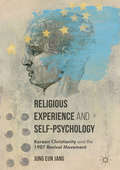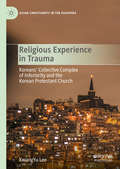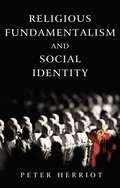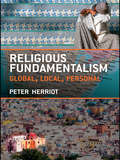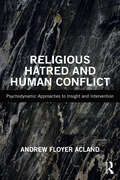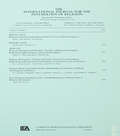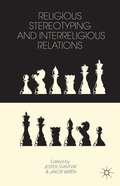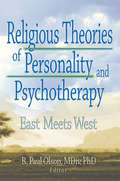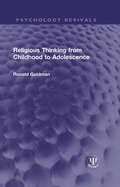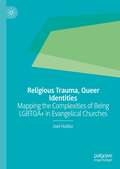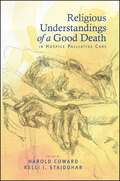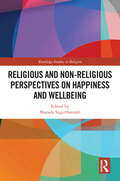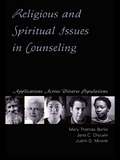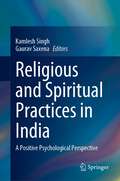- Table View
- List View
Religion, Narcissism and Fanaticism: The Arrogance of Gods
by Tamas PatakiReligion, Narcissism and Fanaticism traces the historical and psychosocial development of religiosity and applies anthropological and psychoanalytic perspectives to the understanding of religions, particularly their fanatical and fundamentalist expressions.Religious ideology, practices and institutions satisfy many human needs, including those arising from our hysterical, obsessional, and narcissistic dispositions: the need to segregate the good and bad aspects of our personalities; to belong to an idealized group; and to feel secure and special by identifying with, or living in the orbit of, a supposedly omnipotent figure. But these needs and their modes of satisfaction are distorted by religions which may then nurture and accommodate malign characteristics, especially in the case of the monotheisms, narcissistic inflation or grandiosity. The book shows how interactions between religious ideology and personal development become intricated in the narcissistic pathology which underlies much of the violence and religious aggression in the world today. It presents both a new account of the historical and psychosocial development of religiosity and a powerful polemic against the religions which delusorily satisfy some of the very needs they create.The book will appeal to psychoanalysts, anthropologists, philosophers, sociologists, and all those interested in the place of religion in the modern world.
Religion, Neuroscience and the Self: A New Personalism (Routledge Studies in Neurotheology, Cognitive Science and Religion)
by Patrick McNamaraThe purpose of this book is to use neuroscience discoveries concerning religious experiences, the Self and personhood to deepen, enhance and interrogate the theological and philosophical set of ideas known as Personalism. McNamara proposes a new eschatological form of personalism that is consistent with current neuroscience models of relevant brain functions concerning the self and personhood and that can meet the catastrophic challenges of the 21st century. Eschatological Personalism, rooted in the philosophical tradition of "Boston Personalism", takes as its starting point the personalist claim that the significance of a self and personality is not fully revealed until it has reached its endpoint, but theologically that end point can only occur within the eschatological realm. That realm is explored in the book along with implications for personalist theory and ethics. Topics covered include the agent intellect, dreams and the imagination, future-orientation and eschatology, phenomenology of Time, social ethics, Love, the challenge of AI, privacy and solitude and the individual ethic of autarchy. This book is an innovative combination of the neuroscientific and theological insights provided by a Personalist viewpoint. As such, it will be of great interest to scholars of Cognitive Science, Theology, Religious Studies and the philosophy of the mind.
Religion, Personality, and Social Behavior
by Vassilis SaroglouPsychological interest in religion, in terms of both theory and empirical research, has been constant since the beginning of psychology. However, since the beginning of the 21st Century, partially due to important social and political events and developments, interest in religion within personality and social psychology has increased. This volume reviews the accumulated research and theory on the major aspects of personality and social psychology as applied to religion. It provides a high quality integrative, systematic, and rigorous review of that work, with a focus on topics that are both central in personality and social psychology and have allowed for the accumulation of solid and replicated and not impressionist knowledge on religion. The contributors are renowned researchers in the field who offer an international perspective that is both illuminating, yet neutral, with respect to religion. The volume’s primary audience are academics, researchers, and advanced students in social psychology, but it will also interest those in sociology, political sciences, and anthropology.
Religion, Social Memory and Conflict
by Sandra Milena Rios OyolaThe field of transitional justice and reconciliation considers social memory to be an important mechanism for acknowledging the violation of victims' rights and a step toward building peace. Societies in conflict, such as Colombia, challenge our current understanding of using memory in the construction of social peace processes, which in turn question the impossibility of forgiving violence that is still to come. Drawing on original ethnographical research, Rios analyses strategies of memorialization after the massacre of Bojay#65533;, Colombia, as an arena of political contention but also of grassroots resistance to persistent and diverse forms of violence. The book focuses on the work of the local grassroots Catholic Church and of the victims' association ten years after the massacre of Bojay#65533;. It explores the role of religion in the management of victims' emotions and in supporting claims of transitional justice from a grassroots perspective in a context of thin political transition.
Religion, Spirituality, and Aging: A Social Work Perspective
by Harry R MoodyLearn how to make a more positive impact with your social work with the agedReligion is an important coping mechanism for many aging adults. Religion, Spirituality, and Aging: A Social Work Perspective presents the latest research that shows how religion and spirituality can improve quality of life for elders. Respected social work researchers and scholars provide insight and practical methods for fostering positive aging while also considering how spirituality and religion can affect practitioners themselves. The full range of advantages and ethical implications are discussed in clear detail from a social work viewpoint. Case studies plainly illustrate the positive impact that the inclusion of spirituality and religion in an aging person&’s life may have on their physical and mental welfare.Organized social work in the early twentieth century actively tried to distance itself from its roots as a form of religious charity in favor of becoming a scientific and professional endeavor. Religion, Spirituality, and Aging once again bridges the gap between social work and spiritual matters by presenting penetrating articles that discusses the issues of the aging soul while examining ways to improve care. Creative strategies are offered to contribute to the spiritual side of aging while considering every implication and ethical question. The compilation is extensively referenced and includes helpful figures and tables to clearly illustrate data and ideas.Religion, Spirituality, and Aging discusses: the latest social work trends and attitudes toward spirituality prayer, meditation, and acts of altruism as interventions an empirical study of how social workers use religion and spirituality as an intervention ethical considerations and best practices religion and spirituality during long-term care the "Postcards to God" project dreams and their relationship to the search for meaning in later life a spiritual approach to positive aging through autobiography dementia and spirituality creating new rituals for sacred aging spiritual master Henri Nouwen&’s principles of aging-and his approaches to caring for older people an interview study on elders&’ spirituality and the changes manifested in their views of religionReligion, Spirituality, and Aging is a remarkable reminder that elders are our future selves. This erudite, well-reasoned examination of aging and spirituality from a social work perspective is crucial reading for social workers, human service professionals who work with the aged, and gerontology scholars.
Religion, Spirituality, and Masculinity: New Insights for Counselors (The Routledge Series on Counseling and Psychotherapy with Boys and Men)
by Anthony Isacco Jay C. WadeReligion, Spirituality, and Masculinity provides concrete, practical suggestions for mental health professionals. Drawing from decades of clinical experience working with men and interdisciplinary insights from psychology, sociology, religion, and more, the authors explore some of the most salient aspects of men’s mental and spiritual health. Chapters focus on topics such as men’s relationships to religion and to masculinity, shame, and forgiveness, and concerns such as pornography use and drifting between religious affiliations. In addition to relevant theory and research, each chapter includes a case study and clear, science-informed strategies that can be incorporated into everyday practice in ways that improve men’s health and wellbeing.
Religion, Theory, Critique: Classic and Contemporary Approaches and Methodologies
by Richard KingReligion, Theory, Critique is an essential tool for learning about theory and method in the study of religion. Leading experts engage with contemporary and classical theories as well as non-Western cultural contexts. Unlike other collections, this anthology emphasizes the dynamic relationship between "religion" as an object of study and different methodological approaches and openly addresses the question of the manifold ways in which "religion," "secular," and "culture" are imagined within different disciplinary horizons. This volume is the first textbook which seeks to engage discussion of classical approaches with contemporary cultural and critical theories.Contributors write on the influence of the natural sciences in the study of religion; the role of European Christianity in modeling theories of religion; religious experience and the interface with cognitive science; the structure and function of religious language; the social-scientific study of religion; ritual in religion; the phenomenology of religion; critical theory and religion; embodiment and religion; the impact of colonialism and modernity; theorizing religion in terms of race and ethnicity; links among religion, nationalism, and globalization; the interplay of gender, sex, and religion; and religion and the environment. Each chapter introduces the topic, identifies key theorists and issues, and respects the pluralistic nature of the scholarship in the field. Altogether, this collection scrutinizes the explicit and implicit assumptions theorists make about religion as an object of analysis.
Religious Beliefs, Evolutionary Psychiatry, and Mental Health in America
by Kevin J. FlannellyThis book provides a new perspective on the association between religious beliefs and mental health. The book is divided into five parts, the first of which traces the development of theories of organic evolution in the cultural and religious context before Charles Darwin. Part II describes the major evolutionary theories that Darwin proposed in his three books on evolution, and the religious, sociological, and scientific reactions to his theories. Part III introduces the reader to the concept of evolutionary psychiatry. It discusses how different regions of the brain evolved over time, and explains that certain brain regions evolved to protect us from danger by assessing threats of harm in the environment, including other humans. Specifically, this part describes: how psychiatric symptoms that are commonly experienced by normal individuals during their everyday lives are the product of brain mechanisms that evolved to protect us from harm; the prevalence rate of psychiatric symptoms in the U. S. general population; how religious and other beliefs influence the brain mechanisms that underlie psychiatric symptoms; and the brain regions that are involved in different psychiatric disorders. Part IV presents the findings of U. S. studies demonstrating that positive beliefs about God and life-after-death, and belief in meaning-in-life and divine forgiveness have salutary associations with mental health, whereas negative beliefs about God and life-after-death, belief in the Devil and human evil, and doubts about one's religious beliefs have pernicious associations with mental health. The last part of the book summarizes each section and recommends research on the brain mechanism underlying psychiatric symptoms, and the relationships among these brain mechanisms, religious beliefs, and mental health in the context of ETAS Theory.
Religious Conversion: a Bio-Psychological Study
by Sante de SanctisThis is Volume II of six in a collection on Psychology and Religion. Originally published in 1927, this is a Bio-Psychological study with a special aim (the reconstruction of the empirical Ego), and its own method (introspection).
Religious Experience Reconsidered: A Building-Block Approach to the Study of Religion and Other Special Things
by Ann TavesHow the sciences of the mind can advance the study of religionThe essence of religion was once widely thought to be a unique form of experience that could not be explained in neurological, psychological, or sociological terms. In recent decades scholars have questioned the privileging of the idea of religious experience in the study of religion, an approach that effectively isolated the study of religion from the social and natural sciences. Religious Experience Reconsidered lays out a framework for research into religious phenomena that reclaims experience as a central concept while bridging the divide between religious studies and the sciences.Ann Taves shifts the focus from "religious experience," conceived as a fixed and stable thing, to an examination of the processes by which people attribute meaning to their experiences. She proposes a new approach that unites the study of religion with fields as diverse as neuroscience, anthropology, sociology, and psychology to better understand how these processes are incorporated into the broader cultural formations we think of as religious or spiritual. Taves addresses a series of key questions: how can we set up studies without obscuring contestations over meaning and value? What is the relationship between experience and consciousness? How can research into consciousness help us access and interpret the experiences of others? Why do people individually or collectively explain their experiences in religious terms? How can we set up studies that allow us to compare experiences across times and cultures?Religious Experience Reconsidered demonstrates how methods from the sciences can be combined with those from the humanities to advance a naturalistic understanding of the experiences that people deem religious.
Religious Experience and Self-Psychology: Korean Christianity and the 1907 Revival Movement
by Jung Eun JangThis book explores the 1907 Korean Revival Movement from a self psychological perspective. The examination of the psychological processes in the movement based on Heinz Kohut's self psychology can shed light on religious experiences as selfobject experiences by identifying the sense of defeatedness and helplessness that Korean people experienced under Japanese occupation as what Kohut calls self-fragmentation of the Korean group self and explaining its therapeutic functions which facilitate potential for the narcissistic nourishment of the fragmented group self leading to renewed self-esteem, transformation, and empowerment of the Korean people. Korean people in the early 1900s experienced abuses and oppression by corrupt officials and exploitation by Japanese government. Through religious experiences which emphasized the individual repentance, the experience of God through the spirit, emphasis on prayer, and eschatological faith, the Korean Revival Movement in 1907 enabled its followers to experience mirroring and idealizing selfobjects which function as a role of transforming the lower shape of narcissism into the higher one.
Religious Experience in Trauma: Koreans’ Collective Complex of Inferiority and the Korean Protestant Church (Asian Christianity in the Diaspora)
by KwangYu LeeThis book offers a psychohistorical analysis of the rapid growth of the Korean Protestant Church. KwangYu Lee looks at some of the traumatic historical events of Korea in the 20th century, including the fall of the Joseon Dynasty (1392-1910), the Japanese Occupation (1910-1945), the Korean War (1950-1953), and the Korean Military Dictatorship (1961-1987), and explores the psychological impacts of these events on the collective unconsciousness of Koreans. He argues that Koreans’ collective (or cultural) complex of inferiority, which was caused and gradually exacerbated by these traumatic events, along with their psychological relationships with their two colonizers—the Japanese and Americans—prompted them to convert to Korean Protestantism en masse as a means to avoid their psychological pains and to fulfil their futile desire to become like Americans, their overtly idealized psychological-object.
Religious Fundamentalism and Social Identity
by Peter HerriotThe attacks on the World Trade Centre and the Pentagon in the United States of September 11th, 2001 brought the phenomenon of religious fundamentalism to the world's attention.Sociological research has clearly demonstrated that fundamentalists are primarily reacting against modernity, and believe that they are fighting for the very survival of their faith against the secular enemy. But we understand very little about how and why people join fundamentalist movements and embrace a set of beliefs, values and norms of behaviour which are counter-cultural. This is essentially a question for social psychology, since it involves both social relations and individual selves. Drawing on a broad theoretical perspective, social identity theory, Peter Herriot addresses two key questions: why do fundamentalists identify themselves as an in-group fighting against various out-groups? And how do the psychological needs for self-esteem and meaning motivate them? Case studies of Mohammed Atta, the leader of the 9/11 hijackers, and of the current controversy in the Anglican Church about gay priests and bishops, demonstrate how fruitfully this theory can be applied to fundamentalist conflicts. It also offers psychologically sensible ways of managing such conflicts, rather than treating fundamentalists as an enemy to be defeated. Religious Fundamentalism and Social Identity is unique in applying social identity theory to fundamentalism, and rare in that it provides psychological (in addition to sociological) analyses of the phenomenon. It is a valuable resource for courses in social psychology which seek to demonstrate the applicability of social psychological theory to the real world.
Religious Fundamentalism: Global, Local and Personal
by Peter HerriotHow does a religious fundamentalist come to embrace a counter-cultural world view? Fundamentalism can be analysed from a variety of perspectives. It is a type of belief system which enables individuals to make sense of their lives and provides them with an identity. It is a social phenomenon, in which strictly religious people act according to the norms, values, and beliefs of the group to which they belong. It is a cultural product, in the sense that different cultural settings result in different forms of fundamentalism. And it is a global phenomenon, in the obvious sense that it is to be found everywhere, and also because it is both a reaction against, and also a part of, the globalising modern world. Religious Fundamentalism deals with all of these four levels of analysis, uniquely combining sociological and psychological perspectives, and relating them to each other. Each chapter is followed by a lengthy case study, and these range from a close textual analysis of George W. Bush’s second inaugural speech through to a treatment of Al-Qaida as a global media event. This book provides a comprehensive social scientific perspective on a subject of immense contemporary significance, and should be of use both to university students and also to students of the contemporary world.
Religious Hair Display and Its Meanings (Popular Culture, Religion and Society. A Social-Scientific Approach #4)
by William C. Innes, JrThis book explores the fascinating world of religious hair observances within six religious traditions that account for 77% of the world’s adherents: Judaism, Christianity, Islam, Hinduism, Buddhism, and Sikhism. Symbolic use of hair has been, and remains, prevalent in all six and carries significant amounts of religious and social meaning. Hair is a unique body substance. It can be shaped and colored, removed from us without pain but still retain an individual’s essence, signal our age, sex, and sexual maturity, and much, much more. The book’s approach is to situate each practice within its tradition. That requires a study of its foundational leaders and their teachings, sacred texts (where they mention hair), its rites and rituals, ideas of religious power and subsequent historical development. Contemporary practitioners are interviewed for their motivations. Even more insight can be gleaned by searching beyond an overt religious purpose. Social scientists from anthropology, sociology, psychology, and related fields bring their research to deliver added perceptions.The author reveals how hair practices are created from ancient psychological and cultural impulses, become modified by time, culture and religious intent, and are adopted by adherents for reasons ranging from personal religious expression to group identity. This book is written for the interested observer of our increasingly diverse society and for the student of comparative religion and sociology. It will change forever how you see hair.
Religious Hatred and Human Conflict: Psychodynamic Approaches to Insight and Intervention
by Andrew Floyer AclandReligious Hatred and Human Conflict focuses the lens of psychodynamic psychology on a phenomenon that often confounds conventional thinking – the intensity of conflict with religious or quasi-religious dimensions. The book highlights six dimensions of religion: identity, doctrine and practice, emotion and experience, mythology, sacred values and power and control, exploring how these can give rise to religious hatred and lead to marginalisation, persecution and even genocide. It also explores reasons for the evolution of religion and religious hatred, and their relationship with human behaviour through contemporary issues such as fundamentalism, martyrdom, clerical narcissism and apocalyptic belief. Acland examines how religious hatred and conflict may be transcended by facilitating processes of dialogue and diapraxis which enable a systematic understanding of prejudices and projections. Last, it offers practical methods and strategies for helping individuals and communities grow beyond the constraints of religious hatred, treating religious hatred as a psycho-spiritual problem that requires self-understanding. Identifying the implications for professionals in conflict resolution and mediation, politicians, community leaders, diplomats and anyone working to prevent or reduce conflict where religious belief is a factor, this book sets out how those tasked with intervening can respond to the challenges involved. It will also be highly relevant reading for students and researchers of psychology and religious studies.
Religious Orientation and Authoritarianism in Cross-cultural Perspective: A Special Issue of the international Journal for the Psychology of Religion
by Raymond F. PaloutzianFirst published in 1999. Routledge is an imprint of Taylor & Francis, an informa company.
Religious Stereotyping and Interreligious Relations
by Jesper Svartvik Jakob WirénReligion can heal, but it can hurt as well. This collection of essays addresses some key issues of religious stereotyping, prejudice, and discrimination, and considers a wide range of important topics which haunt our societies today. When stereotyping becomes the oxygen we inhale, when it is so important to us that we cannot see how we can survive without it - what can and should we do? Twenty-two scholars from Australia, Europe, the Middle East and North America explore the anatomy of various forms of stereotyping and ways to oppose them.
Religious Theories of Personality and Psychotherapy: East Meets West
by Frank De Piano Ashe Mukherjee Scott Mitchel Kamilar Lynne M Hagen Elaine Hartsman R. Paul OlsonIntegrate spiritual traditions with psychological healing!In this fascinating volume, clinical practitioners of different religious traditions examine the same clinical case, offering insights, interventions, and explanations of transformation and healing. This practical approach allows them to explore broader issues of personality theory and psychology from the perspectives of various spiritual traditions: Hinduism, Buddhism, Taoism, Judaism, Christianity, and Islam. Religious Theories of Personality and Psychotherapy addresses both the practical issues of doing psychotherapy and the deeper need to relate psychology and theology. After providing a thorough introduction to the spiritual tradition, each author presents a critical psychological theory of personality and psychotherapy grounded in that tradition. The authors address the questions of what it means to be a person, what causes human distress, and how individuals experience healing. Religious Theories of Personality and Psychotherapy offers profound insights into the urgent issues of human suffering and psychological transformation, including: theories of personality structure and human motivation the nature of experience and processes of change the dialectical relation of theology and psychology convergences and difference among the religious psychologiesMarrying theory and practice, spirit and psyche, Religious Theories of Personality and Psychotherapy offers profound insights and effective interventions. Mental health professionals, clergy, and scholars in religion, cross-cultural studies, personality, counseling, and psychotherapy will find this breakthrough book a life-changing experience and an invaluable resource.
Religious Thinking from Childhood to Adolescence (Psychology Revivals)
by Ronald GoldmanFirst published in 1964, Religious Thinking from Childhood to Adolescence describes the capacities of pupils of varying ages, abilities and backgrounds to understand religious truths. How concepts of the Bible, of God, of Jesus, of Prayer and of the Church developed from the early years is seen within the psychological context of maturing thought, and the implications for religious education, which are provocative and far-reaching, are explored. Teachers, clergy and parents will find this book a challenge to reconsider not only how the growing child views what he is taught but also the reasons why he frequently misunderstands religious teaching. By presenting a systematic account of religious thinking from 6 to 17 years, Dr. Goldman adds a new dimension to our insights into child development.
Religious Trauma, Queer Identities: Mapping the Complexities of Being LGBTQA+ in Evangelical Churches
by Joel HollierIn a polarised milieu that too often posits “queer” and “Christian” as competing realms, this book explores the complexities of identity development, religious traumatisation, and the task of creating safe faith spaces in which LGBTQA+ people can find healing, particularly in the Evangelical context. First, Joel Hollier examines the historical path of Evangelicalism, providing context for the current terrain of the “culture war” we find ourselves in. He then parses out experiences of gender/sexuality and religious/spiritual identity development, grounding them in an evolving theoretical base. Finally, Hollier offers a rounded critique of Evangelical church structures and mechanisms of trauma that hinder the healing process, along with potential sources of healing. Central to this work are the voices of LGBTQA+ people whose stories weave together a deeper understanding of the harms the Church has perpetrated, and the path forward.
Religious Understandings of a Good Death in Hospice Palliative Care (SUNY series in Religious Studies)
by Harold Coward Kelli I. StajduharWinner of the 2012 AJN (American Journal of Nursing) Book of the Year Award in the Hospice and Palliative Care categoryIn the 1960s, English physician and committed Christian Cicely Saunders introduced a new way of treating the terminally ill that she called "hospice care." Emphasizing a holistic and compassionate approach, her model led to the rapid growth of a worldwide hospice movement. Aspects of the early hospice model that stressed attention to the religious dimensions of death and dying, while still recognized and practiced, have developed outside the purview of academic inquiry and consideration. Meanwhile, global migration and multicultural diversification in the West have dramatically altered the profile of contemporary hospice care. In response to these developments, this volume is the first to critically explore how religious understandings of death are manifested and experienced in palliative care settings.Contributors discuss how a "good death" is conceived within the major religious traditions of Christianity, Islam, Hinduism, Judaism, Buddhism, Chinese religion, and Aboriginal spirituality. A variety of real-world examples are presented in case studies of a Buddhist hospice center in Thailand, Ugandan approaches to dying with HIV/AIDS, Punjabi extended-family hospice care, and pediatric palliative care. The work sheds new light on the significance of religious belief and practice at the end of life, at the many forms religious understanding can take, and at the spiritual pain that so often accompanies the physical pain of the dying person.
Religious and Non-Religious Perspectives on Happiness and Wellbeing (Routledge Studies in Religion)
by Sharada SugirtharajahThis book explores the theme of happiness and well-being from religious, spiritual, philosophical, psychological, humanistic, and health perspectives. Taking a non-binary approach, it considers how happiness in particular has been understood and appropriated in religious and non-religious strands of thought. The chapters offer incisive insight from a variety of perspectives, including humanism, atheism and major religions such as Christianity, Islam, Buddhism, Hinduism, and Judaism. Together they demonstrate that although worldviews might vary substantially, there are concurrences across religious and non-religious perspectives on happiness that provide a common ground for further cross-cultural and interreligious exploration. What the book makes clear is that happiness is not a static or monolithic category. It is an ongoing process of being and becoming, striving and seeking, living ethically and meaningfully, as well as arriving at a tranquil state of being. This multifaceted volume makes a fresh contribution to the contemporary study of happiness and is valuable reading for scholars and students from religious studies and theology, including those interested in interreligious dialogue and the psychology of religion, as well as positive psychology.
Religious and Spiritual Issues in Counseling: Applications Across Diverse Populations
by Mary Thomas Burke Jane Carvile Chauvin Judith G. MirantiReligious and Spiritual Issues in Counseling is a comprehensive resource for counselors, psychotherapists and psychologists seeking to understand and incorporate the spiritual dimension of a client's person, and to use this understanding in developing successful intervention strategies with clients. Including case studies and exercises for self-exploration, this book covers specific groups, such as the elderly, the homeless as well as multicultural populations. Human development concerns are integrated into the book and address the changing role that spirituality plays throughout the lifespan.
Religious and Spiritual Practices in India: A Positive Psychological Perspective
by Kamlesh Singh Gaurav SaxenaThis book explores the positive psychological aspects of religion and spirituality in the Indian context. It discusses the concepts and practices of Hinduism, Islam, Buddhism, Christianity, Jainism, and Sikhism and their impact on overall well-being. As the global enthusiasm for Indian spirituality grows, this book brings together scholars to share their perspectives and reflections on various religious aspects. The chapters offer readers a psychological "capsule" of mental health, well-being, compassion, kindness, character strength, mind-body relationship, and mindfulness, providing practical strategies for a better quality of life.Furthermore, this book offers insights into the different perspectives of happiness and well-being measured across diverse demographics. It also provides a qualitative conceptualization of happiness among older people, reflections on positive aging, and highlights the facilitators and inhibitors of happiness. With its comprehensive coverage and multidisciplinary approach, this book serves as a valuable reference for postgraduate and doctoral students of Psychology, as well as a treasure trove in the libraries for researchers and faculties associated with spiritual psychology, positive psychology, religious studies, comparative literature, mental health professionals, academicians, and anyone interested in allied health fields.
